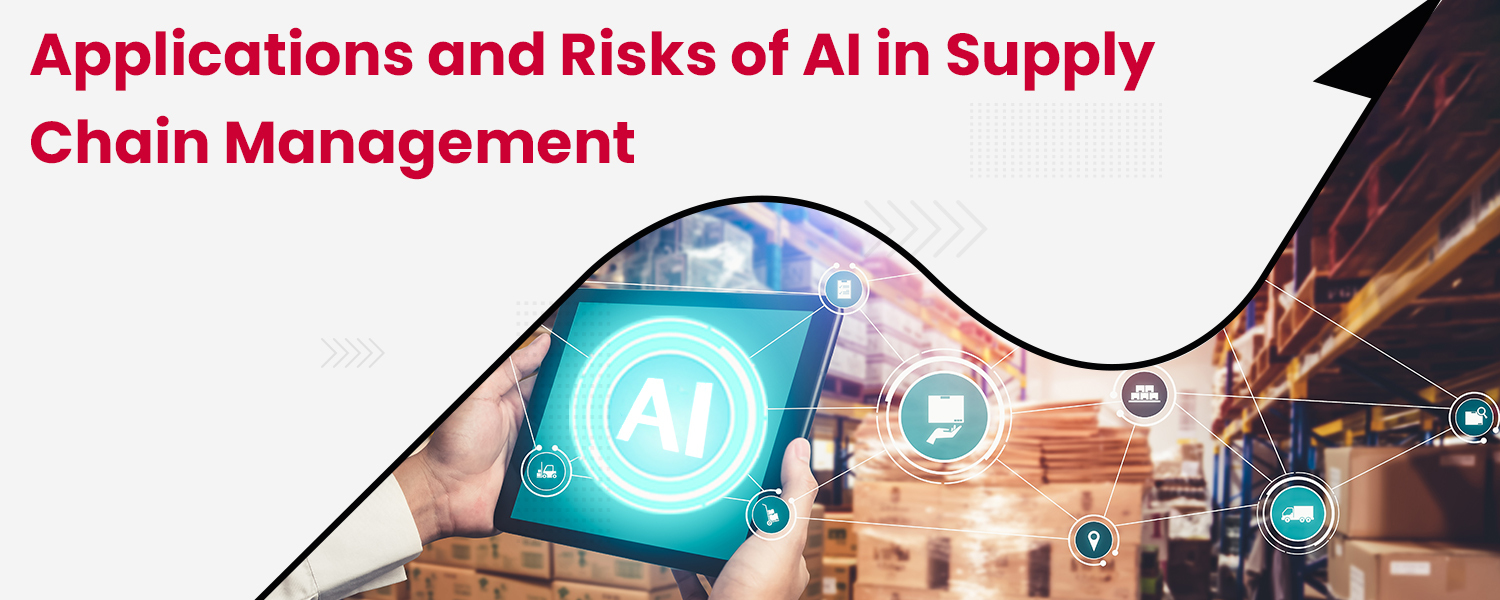Artificial Intelligence (AI), a buzzword in sci-fi movies a decade back, has now become mainstream.
AI is not just a buzzword today. It’s the key to unlocking unparalleled efficiency and productivity across the supply chain.
It is revolutionising how businesses forecast demand, manage inventories, navigate international relations, and even train our workforce, making our supply chains more resilient, efficient, and customer-focused. PwC even estimates that AI applications could contribute a staggering $15.7 trillion to the global economy by 2030. Therefore, it has never been more crucial to understand AI applications in supply chain management than ever before.
In the following sections of this blog, we’ll understand the meaning of AI in supply chain management deeply and also discuss the applications of AI and their risk in the supply chain.
What is the meaning of Artificial Intelligence in Supply Chain Management?
Artificial Intelligence (AI), the term often used to describe machines mimicking human intelligence, goes beyond simple automation. It implies a shift from product-focused strategies to outcome-based strategies—a change that could make existing supply chain models obsolete.
In essence, AI in supply chain management represents a paradigm shift in how organisations manage and optimise their supply chains. Its role in supply chain management ranges from inventory management, demand forecasting, and procurement to logistics, delivery, and customer service.
But the magic lies in how AI leverages machine learning and IoT to optimise these processes, potentially leading to operational efficiency, cost reduction, and improved customer satisfaction. Furthermore, the adoption of AI in supply chain management allows companies to provide more differentiated and efficient services to their customers.
What are the applications of AI in Supply Chain Management?
AI as a Tool for Optimising Operational Efficiency
Artificial Intelligence, when integrated into supply chain management, can significantly enhance operational efficiency. By reducing costs associated with redundant tasks, managing resources better, and automating repetitive tasks, AI transforms supply chain operations.
The Role of AI in Predictive Analytics and Adaptive Learning
With predictive analytics, AI can identify patterns and trends, providing valuable foresight. It can anticipate potential supply chain disruptions, fluctuating demand, and even supplier reliability. Additionally, through adaptive learning, AI continues to refine its analytical capabilities, improving supply chain operations over time.
Utilisation of AI for Data Analysis
In the era of big data, AI plays a pivotal role in extracting insights from vast data sets. AI can consolidate data from various sources, interpret complex data sets, and provide actionable insights to businesses. These insights fuel data-driven decision-making, fostering better strategies and more informed operational choices.
Role of AI in Automating Critical Analyses
AI shines in its ability to automate crucial analysis processes. By identifying emerging trends, accurately forecasting demand, predicting inventory levels, and even preempting equipment failures, AI proves to be an indispensable ally in the modern hybrid order fulfilment model used by different eCommerce businesses today.
Enhancement of Competitiveness through AI
AI has a transformative impact on competitiveness within supply chain management. By significantly reducing processing time and enabling smarter, AI-driven decisions, organisations can stay ahead of the curve. It also enables personalised service, improving customer relationships and fostering brand loyalty.
Cloud-Based AI Strategies
Cloud-based AI strategies maximise data accessibility, reliability, and utilisation. By utilising cloud systems, businesses can streamline important analyses, optimise their use of AI technologies, and improve their competitiveness by making quicker and more precise decisions.
ChatGPT in Supply Chain Management
ChatGPT has several applications in supply chain management. Its advanced natural language processing capabilities make it an invaluable tool in customer service, handling complex communication tasks, and providing tracking and shipment updates.
In addition, it can translate communications to bridge language barriers with international partners, automate business tasks, and even offer personalised employee training, addressing labour shortage issues, and enhancing operational efficiency.
AI in Warehouse Management
AI brings automation to the forefront enabling smart warehousing for online businesses. It enhances efficiency, ensuring optimal resource allocation, seamless inventory management, and significantly reduced error rates. Through predictive analytics, AI manages inventory effectively, mitigating the risk of overstocking or stockouts. AI also promotes safety and efficiency, managing warehouse robotics and automating material handling, picking, and packing processes.
What are the risks of AI in Supply Chain Management?
High Initial Investment and Implementation Costs
The adoption of AI in Supply Chain Management (SCM) can be an expensive endeavour. Initial investments include the cost of AI technologies themselves and expenses linked to implementation, such as infrastructure changes and personnel training.
Larger corporations may find these costs manageable, but smaller businesses could face significant financial strain. But, it’s important to recognise that while the upfront costs may be high, the potential for long-term operational efficiency and cost reductions could offset this. In this case, careful financial planning and return on investment (ROI) analysis become crucial.
Technology and Personnel Readiness
Successfully integrating AI into SCM requires a solid technological infrastructure and a well-prepared human resource team. This includes the need for personnel who are skilled in AI technologies or capable of being trained.
In addition, the organisation’s technological framework must be robust enough to support AI applications without performance compromise. Staff will need ongoing training and development to keep pace with AI evolution, which adds an additional layer of investment and complexity.
Data Management Challenges
AI thrives on data, but handling this data isn’t always straightforward. The siloed nature of data in many organisations can create challenges in its consolidation for AI applications.
Cross-departmental collaboration is often required, which can strain resources and slow progress. Efficient, secure data management is key, especially given the sensitive nature of supply chain data. Without an effective data management strategy, the implementation of AI can lead to disjointed insights and potential security risks.
Dependence on Vendor Services and Customisation
Vendor lock-in is another risk of AI adoption in SCM. While vendor services can provide powerful AI solutions, organisations could find themselves overly dependent on a single vendor’s technology and services.
The possibility of limited customisation may also hamper the application’s effectiveness, leaving businesses unable to fully tailor the technology to their unique requirements. As such, a careful and informed choice of vendors, based on flexibility and customisation options, is key to successful AI implementation.
Uncertainty and Unpredictability of AI Technologies
Despite the many advancements in AI, it still has an element of unpredictability. AI algorithms learn and adapt over time, and their decisions can sometimes stray from human expectations.
There’s always a risk of inaccuracies in AI predictions and decisions, which could have significant consequences in a supply chain context. This unpredictability underlines the importance of maintaining human oversight and management in AI-integrated SCM, to review, guide, and if necessary, correct AI-driven decisions.
Conclusion
As we’ve learned about the applications of AI and their risks in supply chain management, it’s clear that we are standing on the brink of a transformative era.
The power of AI to revolutionise operational efficiency, predictive analytics, data analysis, and competitive edge is nothing short of extraordinary. It’s full of promise but also holds mysteries and challenges.
Therefore, accept AI not as a quick-fix solution but as a voyage towards a future where your supply chain is not just surviving, but truly thriving.




